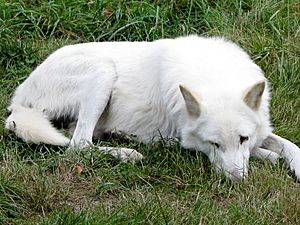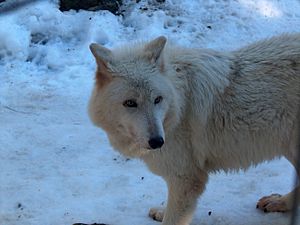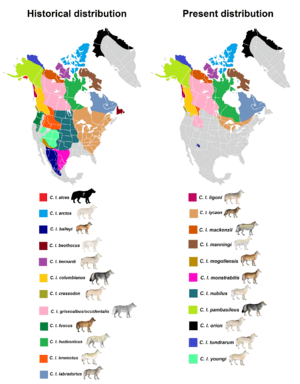Vancouver Island wolf facts for kids
Quick facts for kids Vancouver Island wolf |
|
|---|---|
 |
|
 |
|
| White wolf at the Greater Vancouver Zoo (top); captive grey Vancouver Island wolf at Grouse Mountain | |
| Conservation status | |
| Scientific classification |
|
| Kingdom: | Animalia |
| Phylum: | Chordata |
| Class: | Mammalia |
| Order: | Carnivora |
| Family: | Canidae |
| Genus: | Canis |
| Species: | |
| Subspecies: |
C. l. crassodon
|
| Trinomial name | |
| Canis lupus crassodon Hall, 1932
|
|
 |
|
| Historical and present range of gray wolf subspecies in North America | |
The Vancouver Island wolf (Canis lupus crassodon) is a special type of grey wolf. It lives only on Vancouver Island in Canada, which is part of the Pacific Northwest Coast of North America. These wolves usually live in groups called packs, with about five to twenty wolves in each. Experts believe there are fewer than 180 of these wolves left on Vancouver Island.
Contents
What is a Vancouver Island Wolf?
This wolf is officially known as a subspecies of the Canis lupus, which is the scientific name for the grey wolf. It was first described in 1932.
Scientists have studied the DNA of these wolves. They found that wolves living along the coast, like those in British Columbia and Alaska, are different from wolves living inland. This means they have adapted to their coastal homes. They are often smaller than other wolves because they hunt different kinds of food.
How to Spot a Vancouver Island Wolf
The Vancouver Island wolf is a medium-sized wolf. It usually stands about 26 to 32 inches (66 to 81 cm) tall. From its nose to the end of its tail, it measures about 4 to 5 feet (1.2 to 1.5 meters) long. These wolves typically weigh around 60 pounds (27 kg).
Their fur is usually a mix of grey, brown, and black colors. Sometimes, you might even see a Vancouver Island wolf that is pure white!
What Do Vancouver Island Wolves Eat?
These wolves have a very interesting diet. Most of their food, about 90%, comes from the ocean! This makes them quite unique among wolves.
Their favorite food is salmon, which makes up almost a quarter of what they eat. They also look for other seafood like barnacles, clams, and herring eggs. Sometimes, they hunt seals and river otters. They even eat parts of whale carcasses that wash up on the shore.
See also
 In Spanish: Lobo de Vancouver para niños
In Spanish: Lobo de Vancouver para niños


